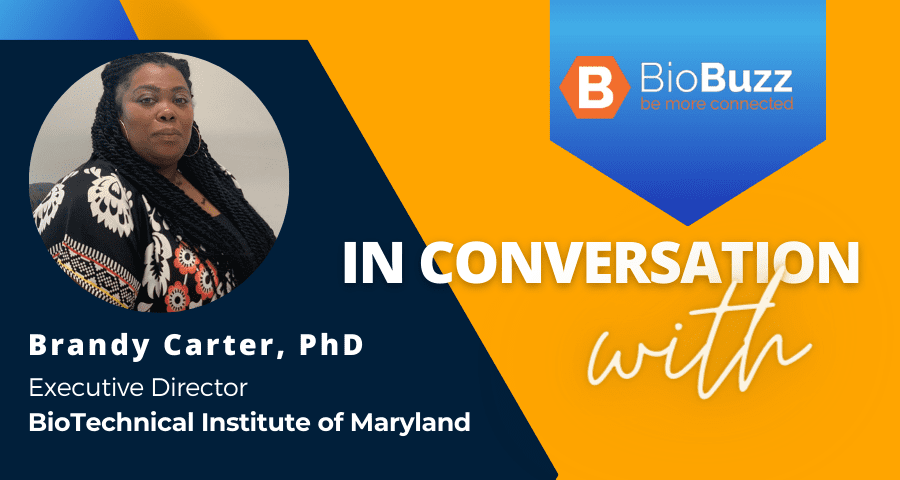
In Conversation With Brandy Carter, PhD, Executive Director of the BioTechnical Institute of Maryland (BTI)
By Kaden Hoffman | October 18, 2023
| BioBuzz has been connecting the life science workforce since 2009. We’ve built an expansive community in the Mid-Atlantic with a national readership that spans from Massachusettes to Florida, and New York to California. For our next chapter, we’re building a proprietary talent logistics model to help employers source and hire life science talent. Learn more. |
Dr. Brandy Carter is the Executive Director of the BioTechnical Institute of Maryland (BTI), an adjunct professor of psychology for Anne Arundel Community College, the owner of Carter Consulting Services, and a marriage and family therapist for SMR Counseling Services.
Dr. Carter will also be on the panel for BioBuzz’s Baltimore Together Summit breakout session Thursday, November 2, Serving the Needs of an Untapped Workforce, in discussing workforce development in Baltimore. She’ll be joined by other high-caliber panelists to include:
- Sarah Flammang, Maryland Deputy Secretary of Service and Civic Innovation, State of Maryland
- Ed Mullin, Executive Director, Baltimore Robotics Center
- Nick Droste, Vice President Board of Directors, Reveille Grounds and Program Manager, Operational Excellence/Human Performance, Emergent BioSolutions
BTI offers tuition-free and cutting-edge training to help individuals who are either under or unemployed become lab workers in Baltimore’s rapidly expanding life sciences sector. We sat down with Dr. Carter to discuss her background, how she got to BTI, and how BTI is creating opportunities for underrepresented groups to help expand a skilled workforce in the biotech industry.
Also worth noting, BTI is one of our Community Partners for the 2023 BioBuzz Awards, and nominations are now open! Nominate the people, programs, and organizations that have shown excellence in the life science community in Maryland, Washington, D.C., and Virginia, as well as Greater Philadelphia.
The Road to Baltimore and BTI
Dr. Carter’s journey to BTI started when she moved to Anne Arundel County 14 years ago. She worked as a contractor for DC Public Schools but felt like she could be giving more to the community explaining, “Race education is extremely important to me. It’s been the thing that has helped catalyze my entire life so I wanted to give back.”
She initially applied to do some volunteer work at South Baltimore Learning Center (SBLC) and was eventually hired as a GED teacher at Clay Pots.
In 2018, the Weinberg Foundation gave a large donation to promote collaboration between nonprofits in Baltimore. This created a connection between SBLC and BTI, where if applicants to BTI’s training program didn’t meet the entry-level scores needed, they could go to SBLC and Dr. Carter would help upskill the participants before they went back to BTI.
This collaboration got Dr. Carter thinking about her current role as a GED teacher at SBLC and if she could be doing more to help struggling people in Baltimore. “Unfortunately, in most careers, a high school diploma doesn’t take you far,” says Dr. Carter. She wanted to help change that and decided to take a job at BTI where she could help train under- and unemployed people to become skilled lab technicians.
For Dr. Carter, this opportunity was always about helping people in the community reach places that previously weren’t possible. These people now had not just a GED, but also certifications and high-level training. “Now that can take you places,” says Dr. Carter, “I’ve seen the transformation that happens with people and their families.”
Making the Biotech Industry More Accessible
Many of the individuals that BTI works with face challenges that prevent them from obtaining better employment, particularly in the biotech industry. They may have kids, transportation issues, or even work multiple jobs to support their families, leaving them little to no time to focus on how they can move to a more rewarding career path.
To help adjust the BTI program to account for these difficulties, Dr. Carter turned to technology. She “started the conversation about using the Oculus and virtual reality” as a new way to deliver instruction to people who may not be able to go to face-to-face classes.
Some of the most basic necessities also serve as barriers for BTI’s students to enter the biotech industry. “A lot of our students have housing insecurities and food instability,” says Dr. Carter, “BTI is not a priority when you don’t have food in your home or you have housing insecurity.” BTI collects food and monetary donations to help support its students with these challenges so that they can focus on building a career in the biotech industry rather than finding a way to put food on the table.
Underrepresentation in the Biotech Industry
Another issue that BTI and Baltimore as a whole face is the underrepresentation of people of color in the biotech industry. People of color only make up around 13% of the biotech industry, despite making up 43% of the country’s population in 2020. This discrepancy is even more evident in Baltimore, which has a population made up of approximately 69% people of color.
BTI works to fix this lack of representation as 98% of their students come from underrepresented groups. For many of these students, their jobs after BTI are their first time, not just in the biotech industry, but in a professional environment. This leads to a variety of challenges as explained by Dr. Carter:
“What does it look like when you may be experiencing microaggressions? There’s no word attached to it, but this is offensive and how do I communicate that?”
BTI is working to prepare these students to enter an unfamiliar environment through mentorship and education so that they know how to respond to these types of challenges. This mentorship is one of the main keys to BTI’s success and they are always looking for experienced mentors in the biotech industry to help teach the students how to navigate these situations.
Building a Better Workforce
BTI’s goal is to train qualified biotechnicians, who are also quality employees. After the students have completed the program they are “trained in DNA extraction, PCR, cell culture, and lab safety, all of the core skills you need,” explained Dr. Carter. She further explained that the main thing you’re going to get with a BTI student is stability “because it’s something that they have lacked in most of their lives and this is their opportunity to achieve that.”
Dr. Carter and BTI are not just helping the people of Baltimore by providing opportunities to enter the biotech space, but also helping to strengthen the biotech industry as a whole by producing high-quality employees.
- About the Author
- Latest Posts
Kaden Hoffman is a recent biomedical engineering graduate from the University of Virginia. He is passionate about the biotech industry, with a particular interest in regenerative medicine and tissue engineering. He grew up in the Montgomery County area and now lives in Los Angeles, CA. Kaden is an avid sports fan and a huge Lord of the Rings nerd.





